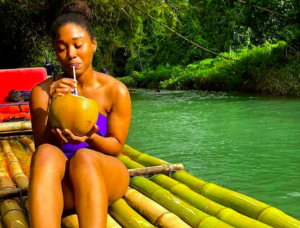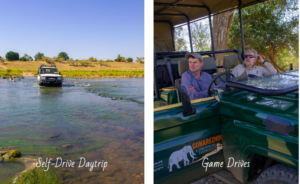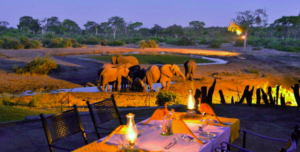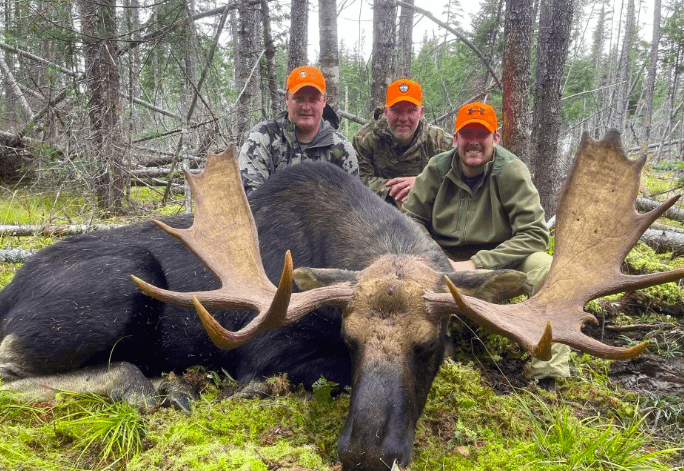
Moose Hunting Colorado, The Thrill of Moose Hunting in Colorado: A Comprehensive Guide.
Moose hunting in Colorado is an exciting and gratifying experience for hunters who want to take on one of North America’s largest big game animals. Colorado’s various landscapes, plentiful wildlife, and tight hunting restrictions make it a great destination for moose hunters. We will cover all you need to know about moose hunting in Colorado, including restrictions, hunting tactics, equipment, and advice for a successful and exciting hunt in this complete book.
Understanding The Animal:

The magnificent moose (Alces alces) is a symbol of wildness and survival. Moose populations in Colorado have grown as a result of effective comeback initiatives. Recognizing the importance of moose hunting, Colorado Parks and Wildlife (CPW) closely monitors it to guarantee sustainable populations and balanced ecosystems.
Regulations for Hunting and Obtaining a License:
To hunt moose in Colorado, hunters must apply for a moose hunting license through the Colorado Parks and Wildlife Department’s limited license draw system. The application process usually begins in early spring, and hunters must apply by the given time. The draw is based on a preference point system, with candidates who have earned preference points being rewarded. To guarantee compliance, it is critical to become acquainted with the exact requirements, timeframes, and licensing costs established by CPW.
Seasons and Units of Hunting:
Colorado is organized into hunting units, each with their own set of rules and seasons. Moose hunting seasons are often conducted in the fall, allowing hunters to chase moose during the rutting season, when males are aggressively seeking mates.
Methods of Hunting:
Spot-and-Stalk:
In Colorado, spot-and-stalk is a common method of moose hunting. Glassing wide meadows, marshes, and wooded regions for moose, then closing the distance on foot for a shooting chance. Patience, tenacity, and great vision are essential for seeing moose in their natural environments.
Calling:
Bulls become more noisy and sensitive to calls during the rut. Mimicking the noises of a cow, moose, or a competing bull can pique the interest of interested bulls, allowing for a close encounter. Mastering moose calling skills and employing proper calls can enhance your chances of success greatly.
Equipment and Gear:
Rifle:
When choosing a rifle for moose hunting, opt for a caliber suitable for large game and capable of delivering a well-placed shot at extended ranges. Popular choices include .30-06 Springfield, .300 Winchester Magnum, and .338 Winchester Magnum. Ensure you are comfortable with your rifle and practice regularly to develop accuracy and proficiency.
Optics:
For effective glassing, invest in high-quality binoculars and a spotting scope. Moose frequently live densely forested locations, and a good set of binoculars will help you detect them from a distance. A rangefinder is also necessary for assessing distances properly and making ethical shots.
Clothing and Gear
Layer your clothing to adjust to shifting weather conditions. Pack rain gear, thick clothes, and harsh terrain-appropriate waterproof footwear. A backpack, game bags for meat preservation, a field dressing kit, GPS or compass, survival gear, and a camera to document your great experiences are also required.
Hunting Moose with an ebike in Colorado
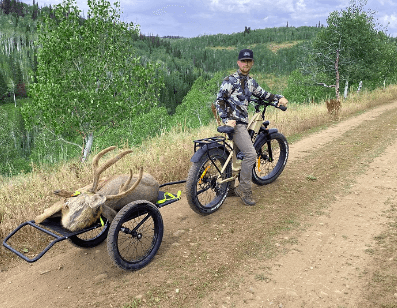
Hunting moose with an eBike in Colorado has some benefits. Here’s what you need to know if you’re going moose hunting with an eBike:
Improved Mobility:
When compared to traditional hunting methods, an eBike gives more mobility and helps you to cover more terrain swiftly and discreetly. It can help you explore isolated regions that are difficult to get on foot, saving you time and energy.
Approach that is quiet and stealthy:
One of the primary advantages of utilizing an eBike for moose hunting is the silent and covert approach it provides. Unlike ATVs or other powered vehicles, eBikes move silently, eliminating noise that may frighten the moose. This boosts your chances of sneaking up on your target unnoticed.
Transportation Efficiency:
Moose hunting frequently necessitates traversing huge regions and covering enormous distances. An eBike may be a dependable and efficient method of transportation, allowing you to move rapidly between hunting and scouting areas. It can also help you transfer your equipment, game, and possibly hefty cargo.
Range and battery life:
Consider your eBike’s battery life and range. Make sure the battery has the capacity to survive the duration of your hunting expeditions, taking into account the distance you need to go and any additional weight you may be carrying. It is critical to plan your hunting trips and be informed of possible charging choices if necessary.
Considerations of the Terrain:
The landscape in Colorado may be tough and difficult, with steep slopes, rocky surfaces, and uneven routes. When selecting an eBike for moose hunting, look for one that is designed for off-road use and has adequate suspension and durable tires to tackle the terrain. Check if your eBike has characteristics that give stability and traction, allowing you to maneuver over a variety of terrains.
Remember that hunting success depends on various factors, including knowledge of the area, understanding moose behavior, and employing effective hunting techniques. While an eBike can enhance your hunting experience, it’s essential to combine it with proper hunting skills and strategies for a successful and ethical moose hunt in Colorado.
The landscape in Colorado may be tough and difficult, with steep slopes, rocky surfaces, and uneven routes. When selecting an eBike for moose hunting, look for one that is designed for off-road use and has adequate suspension and durable tires to tackle the terrain. Check if your eBike has characteristics that give stability and traction, allowing you to maneuver over a variety of terrains.
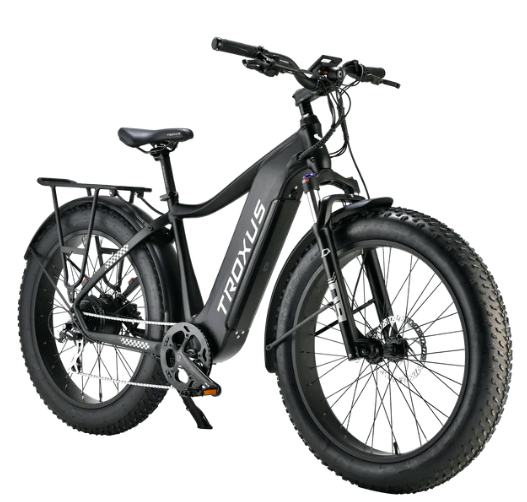
How much does it cost to moose hunt in Colorado?
The cost of moose hunting in Colorado varies depending on several factors, including the kind of hunt, whether you are a resident or non-resident, and whether you hunt alone or with the assistance of an outfitter or guide.
If you win the draw and acquire a moose hunting license, you must pay the corresponding licensing charge. The cost of a moose hunting license varies depending on where you live. In Colorado, for example, the licensing price for a non-resident adult hunter was $2,240 as of September 2022. Again, the most exact and up-to-date information may be found by consulting the most recent hunting rules.
When is the Colorado moose hunting season?

The moose hunting season in Colorado varies according on the hunting unit and method used. Moose hunting seasons in Colorado typically take place in the fall. Consider the following crucial points:
Archery Season:
Moose archery hunting seasons usually last from early to mid-September. These seasons may allow hunters to pursue moose during the rut, when males are actively seeking mates and are more sensitive to calling tactics.
Muzzleloader Season:
Muzzleloader moose hunting seasons typically occur in late September to early October, following the archery season. This season permits the use of muzzleloading rifles, which provide a unique and demanding hunting experience.
Rifle Season:
Moose rifle hunting seasons are often held later in the autumn, commencing in October and extending until November. Rifle seasons provide hunters additional hunting opportunities since they may go farther and shoot longer shots.
It’s crucial to note that hunting seasons and dates in Colorado might vary per hunting unit. Colorado Parks and Wildlife (CPW) has created unique restrictions, quotas, and dates for each hunting unit. To establish the particular hunting season dates for the unit you want to hunt, review the most recent hunting rules given by CPW or visit their official website.
It’s also worth noting that hunting seasons and rules might vary from year to year. As a result, it’s critical to keep educated and to check with Colorado Parks and Wildlife on a frequent basis for the most up-to-date and accurate information on moose hunting seasons in Colorado.
Where is the best moose hunting in Colorado?
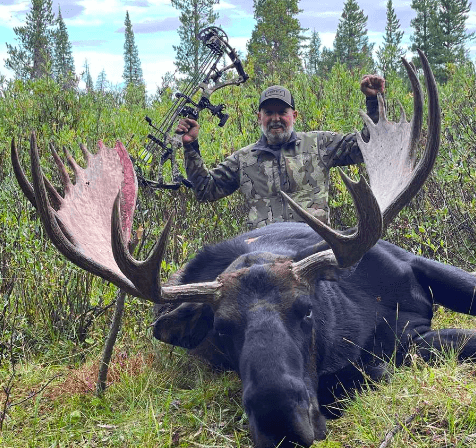
Colorado has multiple hunting units recognized for their moose numbers, and deciding on the “best” moose hunting region can be influenced by a variety of criteria such as personal preferences, accessibility, and success rates. Here are some regions in Colorado that are frequently regarded as ideal moose hunting grounds:
Units 6, 16, and 17:
These units, located in the state’s northwest, are recognized for their high moose populations. They provide a combination of public and private acreage, as well as varied topography and abundant hunting chances.
Units 18 and 28:
These units, located in central Colorado, are notable for their robust moose populations. They include a combination of national forests and wilderness regions, making it good for hunting.
26th and 35th units:
These properties, located in the San Juan Mountains in southern Colorado, provide beautiful scenery as well as excellent moose hunting. They attract moose numbers due to the mix of high-elevation topography and ample flora.
37th and 371st units:
These units, which are located in the Routt National Forest in northwestern Colorado, provide a combination of woods, meadows, and water sources that sustain healthy moose populations. They are popular alternatives for sportsmen looking for a lucrative and tough moose hunting experience.
28th, 37th, and 181st units:
These units in the Grand Mesa and White River National Forests are well-known for trophy moose hunting. They provide moose with a diverse landscape that includes deep woods and open pastures.
It is crucial to note that hunting unit boundaries, quotas, and rules are subject to change. For the most up-to-date information on moose hunting units, success rates, and any special limits or modifications that may apply, reference the most recent Colorado Big Game booklet and connect with Colorado Parks and Wildlife.
Hiring an experienced outfitter or guide who is knowledgeable with the region you want to hunt in may also considerably improve your chances of success and give essential knowledge and support throughout your trip.
Can non-residents of Colorado hunt moose?

Non-residents are permitted to hunt moose in Colorado. Non-residents can apply for moose hunting permits and participate in the restricted license draw with locals, according to Colorado Parks and Wildlife (CPW). However, there are several things to keep in mind and criteria for non-resident moose hunters in Colorado:
Draw for a Limited Number of Licenses:
Non-residents must use the limited license draw method to get a moose hunting license. The draw allocates permits depending on the available quota for each hunting unit. Non-residents must apply and pay the applicable fees within the stated application period.
Fees for Licensing:
Non-residents must pay different license costs than locals. Non-resident moose hunting licenses are often more expensive than resident license fees. Fees can change from year to year, so check the most recent Colorado Big Game brochure or the CPW website for the most up-to-date cost information.
Allocation of Quotas:
Non-resident moose hunting licenses may be limited, with a certain quota set aside for non-resident hunters in each hunting unit. The limit is in place to manage hunting pressure and guarantee the long-term viability of moose populations.
Preference Point System:
In the Colorado draw system, non-resident hunters can accrue preference points. Increasing your preference points enhances your chances of being drawn for a moose license in the future.
Non-residents should be aware of the Colorado hunting rules, which include application deadlines, fees, and unique criteria for non-resident hunters. For the most current and up-to-date information about non-resident moose hunting in Colorado, consult the most recent Colorado Big Game booklet issued by Colorado Parks and Wildlife or visit their official website.
Similar post


